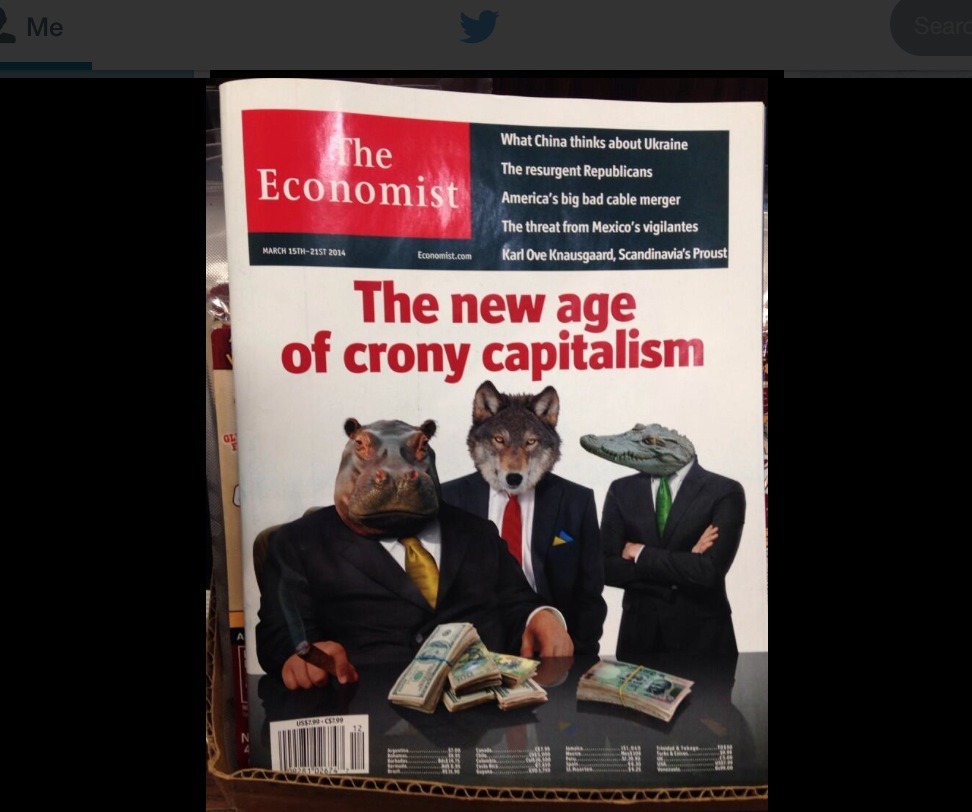Following up from my post earlier today, A First Look at a New Report on Crony Capitalism – Trillions in Corporate Welfare, some really juicy additional corporate welfare queen news has now come across my screen. It appears that Walmart has admitted the potentially severe adverse impact a reduction in food stamp payments could have on its bottom line. This shouldn’t be a surprise to anyone who reads this site, as I have written about this many, many times. Most notably in the very popular post: McDonald’s Math: You Can’t Survive Working for Us.
Well now we have further evidence of this disturbing economic trend straight from the horse’s mouth: Walmart.
The LA Times reports that:
Wal-Mart’s annual report, issued late last week, puts a different spin on things. Buried within the long list of risk factors disclosed to its shareholders–that is, factors “outside our control” that could materially affect financial performance–are these: “changes in the amount of payments made under the Supplement Nutrition Assistance Plan and other public assistance plans, (and) changes in the eligibility requirements of public assistance plans.”
Yes, that says “materially impact.”
Wal-Mart followers say this is the first time the company has made a disclosure like that.
I’m not sure if that is the case, I think they have mentioned it before, but I’m not sure. Either way…
Wal-Mart says it gets more than half its sales from its grocery departments. Since low-income shoppers are a big part of its clientele, it’s unsurprising that that squealing you hear is coming from its annual report. There’s no indication that Wal-Mart executives stepped up to the plate during the debate in Washington to warn Congress off these cuts in assistance to its customers.
One interesting sidelight of Wal-Mart’s disclosure is that it doesn’t actually discuss how the company benefits from public assistance programs by sticking the U.S. taxpayer with the bill for keeping its workforce fed and clothed.
Who’s paying for Wal-Mart’s addiction to paying its employees less than a living wage? You are.
Having fun yet serfs?
Full article here.
In Liberty,
Michael Krieger
Donate bitcoins: 35DBUbbAQHTqbDaAc5mAaN6BqwA2AxuE7G
Follow me on Twitter.




Once again, Michael, you’ve used sleight-of-mouth to rationalize a deceptive headline. “Materially affect” is not synonymous with “depends heavily.”
“F”
“One interesting sidelight of Wal-Mart’s disclosure is that it doesn’t actually discuss how the company benefits from public assistance programs by sticking the U.S. taxpayer with the bill for keeping its workforce fed and clothed.”
I can’t see how taxpayer subsidies to low income workers would reduce the wages that Wal-Mart must pay. Eliminating food stamps and other subsidies to the poor would weaken, not strengthen their bargaining power. At the margin, these subsidies tend to reduce the supply of labor, putting upward pressure on wages.
Food stamps help Wal-Mart by increasing the customer base, not by reducing wage costs.
That’s incorrect. All else equal, if food stamps were cut off, a great many employees of Walmart, McDonalds’, etc would not be able to feed their families. When people find themselves in that position you get civil unrest and rebellion, as we have seen so many times historically throughout the world. You get “Arab Spring” type situations. Normally, a company will simply pay employees at least enough to survive so they aren’t out in the streets or worse. In this case, it is the government that is paying the “civil disobedience” subsidy, and so you get record corporate profits.
If the government welfare wasn’t there you would have one of two things happen.
1) Higher wages
or
2) Massive civil unrest.
That’s my point.
Best,
Michael Krieger
Believing that you have insight into the future evolution of history is the primary philosophical failure of Marx and his many offspring.
CF “Historicism” or “social engineering” or “constructivism” as per Hayek or Popper.
Of course you’ve left out so many other possibilities, on vivid display in the pages of our shared history, as constructivists often do … because of their oversight.
Excellent article. Exposing corporate welfare on the backs of taxpayers is one of today’s most important narratives (alongside the unsustainable ecocide and accelerated climate change impacts of the current over consumptive neo liberal status quo). Keep up the good work!
Hopefully more people will realize that corporate/elite interests must fully account for their use/misuse of natural and human capital and that more of the “profits” must be equitably/sustainably circulated into the local eco economies from where such capital inputs originated. California is turning out to be an excellent case study for the damaging effects of the intersection of corporate greed and lack of scientifically based accountable management and regulation. As water is sucked out of it’s natural place in nature’s balanced hydrological cycle by unsustainable industrial agriculture, poorly managed development, fracking/oil and gas and other human activities, it’s becoming increasingly apparent that the lack of fairly assessed corporate taxes, commons royalties and sustainable governance practices has led to this deficient paradigm – one that is leading us towards structural disruption.
In the meantime, people can vote with their consumptive choices – by purchasing sustainable goods from ethical suppliers that adhere to practices that promote community resiliency. For instance, I do not shop at Walmart. As well, voting against Trade agreements that seek to exploit natural/human capital – and voting for higher coporate taxes and regulatory accountability for tax “avoidance”/tax havens are also steps in the right direction towards increased stewardship of the underlying health and furture prosperity of those resources. Corporate welfare continues to siphon the wealth from society. We can no longer sit idly by while an increasing percentage of the population falls out of the middle class in this debt/serf capitalism ponzi scheme paradigm – one that will only get worse as technology continues to replace huge sectors of the human workforce.